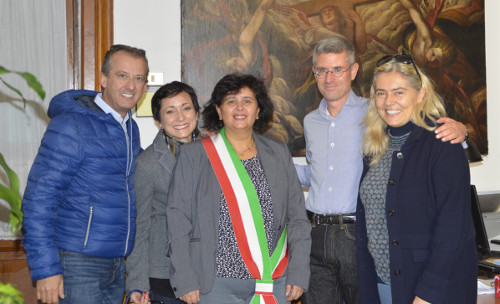Applying for Italian Citizenship (with few tears)

The lure of Italy is undeniable. So much so you're pondering if you should apply for Italian citizenship - but you might not be so sure about the process. Inspired by the BrExit referendum, the Scottish association Casa Scozia held a seminar on Italian citizenship for Brits and other English speakers in the Milan area. As a naturalised Italian I was invited to present what I learned about the citizenship application process.
Multiple routes to Italian citizenship
 The first thing to know is there are multiple ways to qualify for Italian citizenship; consult the applicable law for the full details, but in a nutshell:
The first thing to know is there are multiple ways to qualify for Italian citizenship; consult the applicable law for the full details, but in a nutshell:
- Marriage to an Italian citizen - at time of application & at swearing in!
- Residency (naturalisation) - 4 years required for EU nationals, 10 years for most others; must be continuous & documented; the applicant must have "sufficient" income
- Italian ancestry - parents ("automatic") or paternal ancestors; maternal ancestors from 1948 onward
- Born in Italy - with some restrictions
- Asylum
- Have worked for the Italian State
Some routes are given preferential treatment, i.e. marriage based applications are processed much quicker than residency based applications. If you can apply based on marriage or residency, you should apply based on marriage, with one big caveat. You must still be married (not separated nor divorced) at the time citizenship is approved.
Gathering the necessary documentation
Should you decide to apply, you'll need to gather the appropriate documents. They include:
- Birth certificate, duly legalised with a court certified Italian translation.
- Legalisation is based on a 1961 international convention; see Apostille in Wikipedia for more details
- UK citizens: there is a specific government office for legalisation
- US citizens: birth certificates need an Apostille from the Secretary of State where the certificate is issued
- The translation must be certified by a court (tribunale) recognized translator. Tip: if you or someone you know is capable of a quality translation, you might be able to reduce the cost of the translation certification by providing the translation rather than having the translator do it.
- Criminal record certificate(s) - from where you've lived, duly legalised and accompanied by a certified Italian translation
- US citizens should get an FBI criminal background check;
- You need to provide a set of finger prints on a card, the finger prints must be done at any local police station in the US.
- The US Department of State will issue the Apostille for the FBI document as it is a federal document. In the past the Secretary of State in West Virgina did this part, that is no longer true.
- Current photo ID (passport or identity card)
- Payment receipt for € 200
- Applying using the marriage route?
- You'll need your marriage certificate issued by the relevant municipality in Italy.
- Applying using the Residency route?
- Income statements (CUD, Unico…) from last three years (seems they must document a minimum income €8.500 each year, verify if this if you are near this threshold)
- Permesso di Soggiorno o attestazione di soggiorno per comunitari
Tip: document expiry: you must submit your application no later than 6 months after the date of your foreign criminal record check(s); do insure you've fully mapped out how you will collect all the documentation, including Apostille and translations, before beginning!
Tip: document self-certification: in theory you can provide an "autocertificazione" of any document the Italian State already has access to. You cannot self-certify non-Italian documents. Can you self-certify your Italian income statements and / or marriage certificate? I'm not sure; I was specifically asked for newer copies of my income statements as the process took more than three years.…
Submitting your application
Once you've gathered all of the necessary documents, your application must be submitted online. Tip: you can register at any time to see what the online application asks of you.
Following-up on your application
At this point, you can sit back and wait. Or maybe not…. Your application will first be processed by the local prefettura before, if you're fortunate, being sent to Rome. In the case of Milan, there are multiple ways the Prefettura di Milano allows you to follow-up on the status of your application:
- By phone – but only on Monday mornings; always engaged except in August
- By email – but they "get too many messages", so they simply don't answer emails
- By appointment – which is only possible if they contact you…
- The Interior ministry website provides a simplistic single line "status" message regarding your application. As such this site isn't currently useful: it doesn't provide clear information on application problems nor where an application is in the overall process nor how much time one should expect to wait.
- You can also send old-fashion registered letters to the prefettura or the Ministero del interno. These will probably elicit a form letter response but probably won't actually move your application further along.
You may have detected a pattern here: once your application is submitted, it falls into a black hole. If you're lucky, things will "just work out" and, assuming your application be approved, you'll be granted citizenship within the two years specified by law. In Milan the wait for residence based applications may take 5 or more years; even then your application might only be acted upon if you know who to contact so it gets nudged out of the pile.… Consider seeking out a professional with a proven track record to assist you:
- they can ensure your application is in good shape before you submit it
- they will have inside connections necessary to insure your application doesn't land in limbo
- what is your time and effort worth?
Tip: if you move before your application is approved, you must notify the prefettura of your new address. I also assume you must remain a resident in Italy until your application is approved; check with a specialist for confirmation or consult the law directly.
Once you've become a citizen
Congratulations! Your city of residence will call you in for the swearing ceremony. Once this is done, you'll need to change your carta d'identità. You'll also need to transcribe your birth certificate at the anagrafe, both easy to do. You'll be able to apply for a passport which is also relatively simple to do, although you need to make payments in two different places (bonifico postale + marca da bollo), neither of which is where you apply… benvenuto!
Questions you were about to ask…
- Dual nationality is not a problem, at least from an Italian point of view.
- The application process used to include an interview at the questora. This is no longer the case. You will still need to drop off the hard copies of your documentation at some point.
- Many Italian embassy and consulate websites include instructions on the citizenship application process. This information may not necessarily be up to date.
- There aren't any significant drawbacks that I'm aware of. Do note that if you have real estate abroad, as an Italian citizen (or tax resident for that matter) you will be subject to paying Ivie, and Ivafe if they apply.
In conclusion
Italy has historically been a country of emigration; immigration has not been a political priority and the process clearly reflects this state of affairs. Yet armed with perseverance and the right documents, you too can become Italian!
The intent of this article is to help you along the way; do verify the contents herein reflect the current state of affairs before you begin; the author is not an immigration expert. On the other hand, if you're interested in real estate in Italy, do feel free reach out!
❖ ❖ ❖
The above is offered as general guidance without warranty; changes may have occurred since it was written. Do consult with appropriate qualified professionals regarding your specific situation before making any real estate purchase.
About the author

Sean Michael Carlos grew up in Rhode Island, USA. He studied in the US, UK and Germany before settling in Italy where he has lived for over twenty-five years, in three different regions.
Sean is a licensed real estate agent in Italy with over 10 years experience in the sector and would love to hear from you if you are looking to buy or sell property in Italy.




































